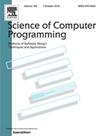Filling query-type text inputs for Android applications via inner-app mining and GPT recommendation
IF 1.4
4区 计算机科学
Q3 COMPUTER SCIENCE, SOFTWARE ENGINEERING
引用次数: 0
Abstract
GUI testing often requires filling reasonable text inputs to activate specific GUI behaviors, which is particularly challenging for query-type inputs used to search contents. Existing techniques may generate input data inconsistent with the query semantic or semantically consistent but not aligned with the current query domain. These data often result in trivial empty searches and are hard to test the internal matching conditions in the query. No search results also affect the further exploration of GUI pages depending on the query. This paper presents MATI (Mining App to generate Text Input), a new test generation method designed to fill query-type input items in Android applications with an intent to activate non-empty query searches. The method is built on a novel idea that the data suitable to input to a query often already occur on the GUI. Instead of creating new data by algorithms or retrieving data from external sources like the existing methods, MATI does inner-app mining to obtain proper candidate data for query inputs in an app. It then recommends the candidate data best fitting a specific query in both the query semantic and domain for test inputting via a GPT model. In experiments on 25 applications, MATI achieved a 94.6% GUI passing rate for query-type inputs–32.4% higher than the leading baseline, QTypist, thanks to its more generated non-empty searches. Its higher passing rates also led to 9.7% increments in the Android Activity coverage achieved during testing when integrating these methods into an automated GUI testing process. Such results suggest that MATI might benefit the practical testing of Android applications.
通过应用程序内部挖掘和GPT推荐为Android应用程序填充查询类型的文本输入
GUI测试通常需要填充合理的文本输入来激活特定的GUI行为,这对于用于搜索内容的查询类型输入来说尤其具有挑战性。现有技术可能生成与查询语义不一致或语义一致但与当前查询域不一致的输入数据。这些数据通常会导致无意义的空搜索,并且很难测试查询中的内部匹配条件。没有搜索结果也会影响根据查询对GUI页面的进一步探索。本文提出了MATI (Mining App to generate Text Input),这是一种新的测试生成方法,用于在Android应用程序中填充查询类型的输入项,目的是激活非空查询搜索。该方法建立在一个新颖的思想之上,即适合输入查询的数据通常已经出现在GUI上。与通过算法创建新数据或从现有方法等外部来源检索数据不同,MATI在应用程序内部进行挖掘,以获得应用程序中查询输入的适当候选数据。然后,它通过GPT模型推荐最适合查询语义和域的特定查询的候选数据,用于测试输入。在对25个应用程序的实验中,MATI在查询类型输入方面实现了94.6%的GUI通过率——比领先的基准QTypist高出32.4%,这要归功于它生成了更多的非空搜索。在将这些方法整合到自动化GUI测试过程中,其较高的通过率也使Android Activity覆盖率增加了9.7%。这样的结果表明,MATI可能有利于Android应用程序的实际测试。
本文章由计算机程序翻译,如有差异,请以英文原文为准。
求助全文
约1分钟内获得全文
求助全文
来源期刊

Science of Computer Programming
工程技术-计算机:软件工程
CiteScore
3.80
自引率
0.00%
发文量
76
审稿时长
67 days
期刊介绍:
Science of Computer Programming is dedicated to the distribution of research results in the areas of software systems development, use and maintenance, including the software aspects of hardware design.
The journal has a wide scope ranging from the many facets of methodological foundations to the details of technical issues andthe aspects of industrial practice.
The subjects of interest to SCP cover the entire spectrum of methods for the entire life cycle of software systems, including
• Requirements, specification, design, validation, verification, coding, testing, maintenance, metrics and renovation of software;
• Design, implementation and evaluation of programming languages;
• Programming environments, development tools, visualisation and animation;
• Management of the development process;
• Human factors in software, software for social interaction, software for social computing;
• Cyber physical systems, and software for the interaction between the physical and the machine;
• Software aspects of infrastructure services, system administration, and network management.
 求助内容:
求助内容: 应助结果提醒方式:
应助结果提醒方式:


